Transparent Samobor Provides Automated Display of Payments, Contracts
July the 27th, 2021 - Transparency isn't something the Croatian authorities are all that used to. With corruption apparently being tackled with a wave of new mayors and local government units doing things differently, one continental Croatian town is going a step further. Meet transparent Samobor.
As Poslovni Dnevnik/Lucija Spiljak writes, in July, Samobor became the only city in all of Croatia to boast an automated display of all of the payments, invoices, contracts and purchase orders made by Samobor's administration in one place, thanks to the digital service iTransparency made by the Zagreb IT and consulting company Libusoft Cicom.
This digital service enables the creation of a transparent Samobor, the publication of timely, accessible, accurate and credible information on the implementation of budget items, which, among other things, prevents irresponsible actions and misuse of public funds, while local government units are encouraged to publish and explain their own budget documentation.
At the same time, the general level of information available to people, the media, entrepreneurs and even investors about local strategies and actions and their results has been raised, and it's all available in just a few clicks on the following website: https://transparentno.samobor.otvorenigrad.hr/isplate.
The director of the company responsible for the development of the newly transparent Samobor's service, Marko Ignjatovic, explained just how the system works and what it means for this city.
“Samobor is currently being provided with insight into payments made out to both individuals and legal entities, as well as incoming invoices, contracts and purchase orders, which will provide people with an accurate insight into all operations. On top of that, further improvements in functionality are being made to make new search and filtering capabilities available; according to time and the desired classification.
The possibility of corruption is definitely now reduced to a minimum and from our experience so far, we can say that the first results are visible very quickly. Unlike some competing solutions, our iTransparency system simply connects to other systems, and all of the data comes in automatically. In this way, additional costs and the possibility of mistakes are avoided, and business itself is facilitated,'' stated Ignjatovic.
The value of the project ranges from 20 to 30,000 kuna. and the company's team gradually developed and upgraded it over the years, while the introduction of the system in Samobor was worked on intensively for two weeks.
The iTransparency service is just one of the nine functionalities of the company within the LC Platform Open that can be implemented in the business of counties, cities and municipalities.
"So far, about 20 cities and about 10 municipalities have joined the project, and some more are currently in the process of being introduced. Digitisation and transparency are no longer a matter of choice but a legal obligation. As a direct consequence of the introduction of digitalisation and transparency, JLP (R) S is becoming more open to people, it's becoming easier and faster to communicate digitally, we can facilitate business insight, and it allows for more efficient budget management and the optimisation of investments,'' said the director.
Most of their team, out of a total of 140 experts, are based in Zagreb, but in order to be more easily accessible to many users, some are located in four business centres in Dalmatia, Primorje, Istria and even further east in Slavonia.
So far, they have achieved successful cooperation with more than 1,200 users, which include budget users, utility companies, residential building managers, companies and non-profit organisations, meaning that the newly transparent Samobor is one client in a long line for this successful Croatian enterprise.
“Thanks to 29 years of experience and numerous references, we've become leaders in the segment of software solutions intended for local and regional self-government units. We're proud to be able to stand out in the field of customer support, consulting services, online education and consulting, system and technical support, design and implementation, etc. Thanks to this transformation of business and comprehensive service, in addition to being an IT company here on the Croatian market, we've also profiled ourselves as a successful consulting company,'' stated Ignjatovic.
For more, follow our politics section.
Mirjana Cagalj Discusses Potential for Croatian Inflation This Autumn
July the 27th, 2021 - Could Croatian inflation be on the horizon at the end of summer as the weather grows colder and autumn arrives? Mirjana Cagalj, a top figure from the Croatian Chamber of Commerce (HGK) doesn't believe it will come to that.
As Poslovni Dnevnik writes, Mirjana Cagalj, the vice-president of the Croatian Chamber of Commerce, spoke for N1 Studio about the increase in the price of everything in the Republic of Croatia, especially in terms of construction materials.
When asked if inflation awaits Croatia as autumn approaches, Mirjana Cagalj's short answer was a very simple no.
"There are some small indicators of that, but none that are so strong that we could now claim that there will be huge inflation coming," Mirjana Cagalj told N1, emphasising how construction materials have really become more expensive in this country.
"Since back in November, when we monitor price movements, iron, copper and aluminum have risen in price by between 80 and 200 percent. Iron has risen by 150 percent, from 3.8 to 8.6 euros, copper from 2 and a few euros to 4.14 per kilogram, and there was an increase in prices of basic polypropylene products, components for pipes, from 800 to 2200 euros per tonne. No construction project can succeed very easily with prices like that.
This happened due to disruptions in oil prices, reduced production and now high demand. No one could have predicted any of that before the price jump, so those who agreed on deals before are now in trouble,'' warned Cagalj, adding that work is happening on aiding projects faced with these obstacles.
"We're communicating with the government, and we've been getting positive feedback from them. We warned the ministries about the increase in prices, and we received information on how this can be regulated - through the Law on Obligations and the Law on Public Procurement. The current regulations must be respected, but yes, they must be changed in the future,'' said Mirjana Cagalj.
When it comes to the still continuing post-earthquake reconstruction of the City of Zagreb, contractors could also find themselves in hot water as a result of this huge price rise.
"Croatian Waters (Hrvatske vode) reacted quickly in agreement with the regulatory agency and gave instructions on how they plan to regulate prices, and a large number of ongoing projects also need to be regulated alongside that. If construction companies abandon a project, we'll end up with much higher prices in the next tender. It's better to regulate the price of certain things now than to lose a contractor.
When the Reconstruction Act was passed, the state regulated the maximum price. The state won't interfere in public tenders, but it can help, as it helped companies during the coronavirus pandemic. Germany has issued an instruction to companies stating that if they're late with the deadlines due to the procurement of materials, they won't be punished for it, and other European countries have done the same,'' said Cagalj.
For more, follow our dedicated lifestyle section.
Pandemic Induced Uncertainty Leading to Many Croatian Zombie Companies
July the 27th, 2021 - Although the title might sound rather funny, Croatian zombie companies are not only no laughing matter but are only increasing in their numbers as a result of the ongoing coronavirus pandemic.
As Poslovni Dnevnik/Jadranka Dozan writes, despite a certain degree of domestic economic recovery and a better macroeconomic outlook, which also reduces short-term risks in the corporate sector, structural vulnerabilities in Croatia and overall exposure to systemic risks remain elevated, according to the Croatian National Bank (CNB).
The risks to the resolvability of companies whose operations were disrupted during the pandemic are especially emphasised, and that same magnifying glass also includes high and rising real estate prices and their, as they said from the CNB, "further separation from the foundations".
The combination of the vaccination progress and the mitigation of epidemiological measures should support the continuation of economic recovery throughout 2021, the new edition of Macroprudential Diagnostics points out, although the risk of increasing Croatian zombie companies remains.
Epidemiological variables such as new strains/mutations of the novel coronavirus, a slower vaccination rollout, or potential vaccine ineffectiveness are also a source of uncertainty for the further course of economic recovery. This is especially true for tourism and other activities more exposed to the effects of such a public health crisis.
Despite the overall better performance of entrepreneurship, risks and vulnerabilities remain elevated as a result of the ongoing situation, which while better, is less than favourable.
Among other things, things all depend on the effectiveness and duration (expiration) of the measures to mitigate the effects of the ongoing global pandemic on liquidity and solvency. In the acute phase of the coronavirus crisis, these risks were mitigated by very generous public sector assistance packages and the adjustment of supervisory rules to try to treat banks' exposure to affected clients.
Due to the still present uncertainties, the risk of the so-called zombification that may adversely affect the operations of banks, but also economic growth in the long run.
"As long as the support measures last, credit losses related to the corporate sector will remain low, but after their expiration, and especially due to the reduction of the capital of companies operating within sectors most exposed to the effects of the pandemic, there could be an increase in risk," warns the CNB .
Data on the fiscalisation of accounts clearly shows the recovery of revenues, but compared to pre-crisis 2019, they are still lagging behind, primarily in the activities most affected by the coronavirus crisis.
These companies, primarily those in tourism and transport (to a lesser extent also from the manufacturing industry), continue to rely on their own accumulated liquidity, the CNB notes. As of the end of May this year, these activities were in the lead with a percentage drop in deposits at the beginning of this year. At the same time, credit data shows that part of the liquidity deficit is being compensated for by additional borrowing.
The share of loans under the moratorium, on the other hand, is gradually declining, and at the same time, exposure to corporate loans in the so-called phase two, which is estimated to increase credit risk at the end of March rose to 22.7 percent.
With the gradual expiration of the moratorium, and especially if the recovery of the economy weakens, the CNB notes that the materialisation of credit risk in this segment could further burden the operations of banks and do nothing to help the increasing number of Croatian zombie companies across heavily affected sectors.
For more, follow our dedicated business section.
Tourists Fooled by Croatian Scammers Offering Someone Else's Accommodation
July the 27th, 2021 - Croatian scammers have fooled at least fifteen German families in a new form of cyber-fraud in which other people's private accommodation units are being offered. The situation occurred in Istria.
As Poslovni Dnevnik writes, as yet unknown Croatian scammers have caused financial (and indeed psychological) damage to at least fifteen German families by falsely offering them a holiday home rental in Istria. On a German website, they published an ad with pictures of the house, introduced themselves as owners and offered the property at an extremely affordable price.
This particular holiday home in Istria was used by these unknown perpetrators for a brazen cyber-scam. The last victim of this particular scam was a tourist from Germany who was suspicious that the house was being rented out as Villa Imamovic, while the pictures read the inscription Casa Delphia. The group of Croatian scammers told her that they had bought the house, but they hadn't replaced the board yet, RTL reported.
"However, the woman in question was suspicious and saw that the price was too low so she started researching and found out that the house was being falsely rented out, that the gentleman she'd spoken to wasn't the owner," said co-owner of the rental house, Ljerka Lisica.
German Edmond Rama wanted to gift his parents a holiday, so he bought them two-week accommodation and plane tickets to Croatia, but when he called the number from the ad again, there was no answer.
“I wanted to see pictures of the house to show them to my parents. I tried to contact them via Ebay and by phone, but there was no answer,'' said Edmond Rama, a victim of the same fraud and likely the same group of Croatian scammers.
He was damaged for about 850 euros, but the worst situation of all involved a single mother with three children.
"In the end, she said that she was amazed, that she didn't know how to explain to her children that she had no more money, and that they weren't going to be able to go on holiday," said a disgusted Ljerka Lisica.
Although the owners themselves haven't actually been harmed, they say that they greatly sympathise with the deceived would-have-been German tourists.
"It's a disaster for these people, and we're involved in it and we feel obligated to those people even though we haven't actually done anything to anyone, we aren't involved in this nor do we have anything to do with it, but it hurts us because our house is involved in it," explained Boris Lisica, the co-owner of the house at the centre of the scam.
From the information available so far, the name used by the fraudster is known: Samir Fabian Imamovic, the actual German IBAN to which the victims paid money is also known. The police are advising people to use verified websites for the renting out of such property and to read the reviews of previous users when choosing.
"They can also check the landlords through the tourist board, and if they suspect that it may be some form of fraud, they can contact the police," said the spokeswoman of the Istrian Police, Suzana Sokac.
The police are not revealing the stage of the criminal investigation into these Croatian scammers at this moment in time.
For more, follow our lifestyle section.
EU Finance Ministers Give Green Light to Croatia's Recovery and Resilience plan
ZAGREB, 26 July 2021 - EU finance ministers on Monday confirmed the positive assessments of national recovery and resilience plans for another four member states, including Croatia, and initiated written procedure for their approval.
Excellent news for four more member states – Croatia, Cyprus, Lithuania and Slovenia. We have confirmed the positive assessments of the national plans of these four countries, Slovenian Finance Minister Andrej Šircelj said after an informal meeting of the Finance and Economic Council.
Since no decisions can be made at informal video meetings, written procedure was launched after the meeting to formally approve the national recovery and resilience plans of Croatia, Cyprus, Lithuania and Slovenia. The procedure is expected to be completed within the next few days.
On 8 July, the Commission gave the green light to Croatia's national recovery and resilience plan, worth €6.3 billion, and forwarded it to the Council for adoption.
Croatia has been allocated €6.3 billion in grants and 3.6 billion in favourable loans under the Recovery and Resilience Facility, the central element of the Next Generation EU recovery plan. It has been decided that Croatia will for now use only grants and that it may ask for loans at a later date. The €6.3 billion amounts to 11.6 percent of Croatia's 2019 GDP.
After the decision on approval of the recovery plan becomes official, Croatia will sign a financing agreement with the Commission and within two months of its signing it will receive an advance of 13 percent of the allocation, or €819 million. It is not yet known whether this amount will be disbursed in one or more tranches.
About ten days ago, EU finance ministers approved the initial batch of 12 national recovery and resilience plans (for Portugal, Spain, Greece, Denmark, Luxembourg, Austria, Slovakia, Latvia, Germany, Italy, Belgium, and France), which means that a total of 16 national plans will have been approved before the summer recess in August.
For more about politics in Croatia, follow TCN's dedicated page.
Matea Jelić Wins Taekwondo Olympic Gold Medal!
July 26, 2021 - Taekwondo fighter Matea Jelić defeated Great Britain's Lauren Williams in the finals of the 67 kg category at the Olympic Games in Tokyo!
It was the duel of the last two European champions in this category - Jelić won gold in Sofia this year, and Williams won gold three years ago in Kazan.
In the uncertain final, the result was 13-13 entering the final minute, but then Williams with two kicks to the body reached an advantage of 17-13. It was 21-15 for Williams until 15 seconds before the end when Jelić managed to reach colossal success with three kicks to the head.
This is the fourth medal for Croatia in the women's taekwondo competition. Before Jelić, bronze medals were won by Sandra Šarić and Martina Zubčić in Beijing in 2008, Lucija Zaninović in London in 2012, and Toni Kanaet earlier on Monday in Tokyo.
TK Marjan Split thus achieved incredible success today in Tokyo! Jelić's gold is the greatest success for Croatian taekwondo at the Olympic Games.
In her first appearance in Tokyo, Jelić defeated Haitian Lauren Lee 22-2, in the quarterfinals Brazilian Milena Titonelli 30-9, and secured a medal with a 15-4 victory against American Paige McPherson in the semis.
More soon...
To follow the latest sports news in Croatia, follow TCN's dedicated page.
To learn more about sport in Croatia, CLICK HERE.
Toni Kanaet Wins Taekwondo Bronze at Olympic Games in Tokyo!
July 26, 2021 - Croatia's Toni Kanaet wins the taekwondo bronze in Tokyo!
Croatian taekwondo fighter Toni Kanaet (25) won the bronze medal at the Olympic Games, defeating Uzbek fighter Nikita Rafalovich 24-18 in the category of up to 80 kilograms!
After a tied first round that ended 6-6, Kanaet gained a 15-8 advantage in the second. Rafalovich reduced the lead to 15-10 with two punches at the beginning of the third round, and when Rafalovich went for all or nothing, Kanaet punished him with two punches and one to the head to secure the victory.
In the first part of the competition, Kanaet defeated Spain's Raul Martinez Garcia 21-15, only to lose in the quarterfinals to the later Russian finalist Maxim Hramchev with a break after the second round.
By passing Hramchev to the final, Kanaet got the opportunity to fight for the bronze through a rematch. He first overpowered Burkina Faso Faysala Sawadoga with a break at the start of the third round due to too large a difference in points. At the time of the break, it was 30-10 for Kanaet.
This is the first men's Olympic medal for Croatia in taekwondo!
To follow the latest sports news in Croatia, follow TCN's dedicated page.
To learn more about sport in Croatia, CLICK HERE.
Croatia Registers 27 New Coronavirus Cases, 2 Deaths
ZAGREB, 26 July 2021 - Croatia has registered 27 new coronavirus cases and two COVID-related deaths in the last 24 hours, the national coronavirus response team said on Monday.
Currently, there are 924 active cases in the country, with 138 infected people receiving hospital treatment, of whom 13 are on ventilators.
Since 25 February 2020, when the first case was confirmed in Croatia, 362,648 people have been registered as having contracted the novel virus, of whom 8,247 have died and 353,477 have recovered, including 110 in the last 24 hours. Currently, 3,521 people are self-isolating.
To date, 2,251,838 people have been tested for coronavirus, including 3,372 in the last 24 hours.
A total of 3,008,752 doses of vaccine have been administered, with 39.9 percent of the total population or 48 percent of the adult population having been vaccinated. 1,620,439 people have been inoculated with at least one dose, of whom 1,433,059 have been fully inoculated (1,388,313 people have received two doses and 44,746 have been vaccinated with the single-dose Jannsen vaccine), which makes up 42.54 percent of the adult population.
For all you need to know about coronavirus specific to Croatia, including travel, border, and quarantine rules, as well as the locations of vaccination points and testing centers across the country, make sure to bookmark our dedicated COVID-19 section and select your preferred language.
EC Concerned About Lawsuits Against Croatian Journalists
ZAGREB, 26 July 2021 - The European Commission last week issued a report on the rule of law in Croatia expressing concern over a large number of the so-called SLAPP lawsuits against reporters and the media and voicing suspicion in the political independence of the media regulator: the Electronic Media Agency.
"Croatia is updating its media legislation to transpose the Audiovisual Media Services Directive, with the revision of the Electronic Media Act to be adopted still in 2021. Concerns about the political independence of the Agency for Electronic Media persist," the Commission said in the report.
Apart from concern regarding the independence of that the Electronic Media Agency which, among other things, is expected to deal with hate speech, the report says that lawsuits against journalists and media outlets also gives rise to concern,
"A legal framework for the protection of journalists is in place, but they continue to face threats. In particular, the high number of strategic lawsuits against public participation (SLAPPs) targeting journalists continues to be a serious concern. Access to information is ensured by law, but delays in the processing of requests from journalists persist."
Zovko: Allegations from report expected
The president of the Croatian Journalists' Association (HND), Hrvoje Zovko, commented on the allegations from the European Commission's report regarding media pluralism and freedom in Croatia, describing them as expected.
"Unfortunately, several categories regarding media freedoms in Croatia have been criticized, including numerous verbal attacks by politicians against journalists and the media. We already have a culture of suing journalists and the media. SLAPPs are a new model of attacks against journalists, aimed at intimidating them and the media and imposing censorship, even destroying them," Zovko said.
He recalled that according to an HND survey, there were 924 active lawsuits against journalists in Croatia in April, adding that the HND had been warning about this problem for years and stressing that this was the reason why Croatia was recognized as a problematic country.
He welcomed the initiative by the Ministry of Culture and Media to set up an expert working group to curb SLAPPs, adding, however, that its results were yet to be seen.
"The HND has been lobbying for quite some time for the decriminalization of slander and defamation. This could be the beginning of curbing violence against journalists and the media through lawsuits," Zovko said.
Ministry of Culture and Media: Expert working group set up
In its comment to Hina on the part of the report concerning attacks on journalists and SLAPP lawsuits, the Ministry of Culture and Media said that similar concerns are raised in many countries and that the Ministry of the Interior responds to every complaint.
The Ministry has set up an expert working group after the European Commission adopted an action plan for European democracy, with the protection of journalists against SLAPP lawsuits as one of its main goals.
The working group includes representatives of the media sector, judiciary, lawyers, and the academic community. It has already begun work and one of its first steps is launching training for judges, lawyers, and journalists in cooperation with the Justice Academy.
After the first meeting of the working group, Minister Obuljen Koržinek stressed the importance of ensuring uniform case law and training of journalists and judges.
The Ministry said that media legislation and other laws based on which such lawsuits are brought will be improved and that co-regulation and self-regulation mechanisms would be established within the professions.
The national recovery and resilience plan will finance a system of public disclosure of information on media financing and the development of a network of fact-checkers to further contribute to transparency and trust in the media, the Ministry said.
Asked to comment on the claim by the European Commission that there are still doubts about the political independence of the Electronic Media Agency and the Electronic Media Council, the Ministry cited European models for the appointment of such bodies.
The Electronic Media Council is appointed by the Croatian parliament based on a proposal by the government following a public call. The appointment model is similar to the prevailing model in Europe. The appointment of Council members by parliament, instead of by the government, was introduced in 2009, with public consultations involving all relevant stakeholders, the Ministry said.
The Electronic Media Agency declined to comment, saying that the European Commission's claim was not corroborated. It said that the process of appointment of members of the Electronic Media Council was the same as in all EU member states, given that they are appointed by parliament, government, a president, or a sovereign.
For more, follow our dedicated politics section.
Peak Season Hvar Town 2021: a Destination Returning to High Quality
July 26, 2021 - A visit to peak season Hvar Town 2021, a pleasant experience very different to just a few years ago.
I met an American friend for a drink in Split the other day. A recent arrival in Croatia, he was just back from his first visit to Hvar Town and was waxing lyrical about the island that had been my home for 13 years.
I smiled. Not just as his obvious love and enthusiasm for what really is one of the most beautiful islands in the world, but also that his (correct) perception of elite Hvar Town was a sign that this magical place has once more found its focus after a rather turbulent few years.
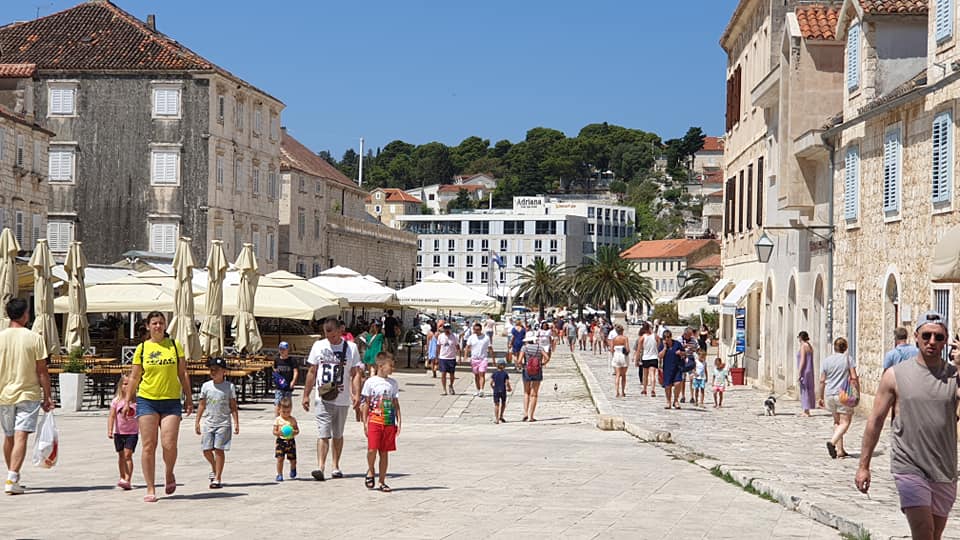
I too had been to Hvar Town last week, my first visit for a while. And it was... different, but in a very pleasant way.
As I listened to my American friend talking about Hvar's beauty, I filled him in a little on the recent history, commenting just how far Hvar Town had come in such a short space of time.
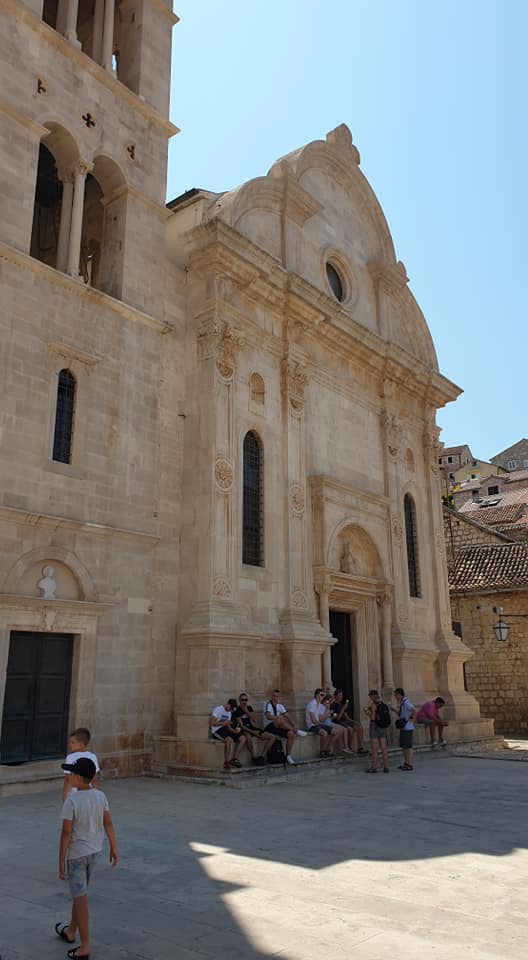
I have been writing about Hvar for over a decade, and with over 9,000 articles written about the island over the years, there is little that I have not covered. And one topic has been the subject of much controversy over the years - Hvar Town and the party.
Hvar Town is a destination which has it all. The Pakleni islands, a spectacular old town, UNESCO heritage, the oldest public theatre in the world, fabulous food and wine, lively nightlife, beaches to die for, and an outstanding adventure tourism offer. When they all work in tandem, the town is magnificent.

But something went badly wrong over the last decade, as the party - always an accepted and welcome part of the tourism makeup - took full control of tourism in Hvar Town. Rather than attracting global headlines for its beauty and culture, Hvar was appearing on lists such as top 7 stag destinations in Europe. The arrival of The Yacht Week brought with it drunken debauchery, The elite waterfront was often taken over by drunken Brits and Aussies, while early morning risers would sometimes have to step over sleeping bodies to go on with their daily business. So bad did things become that the Mayor Riki Novak introduced signs threatening huge fines for people eating, drinking and walking topless on the streets of the historic centre. It was a story which went around the globe.
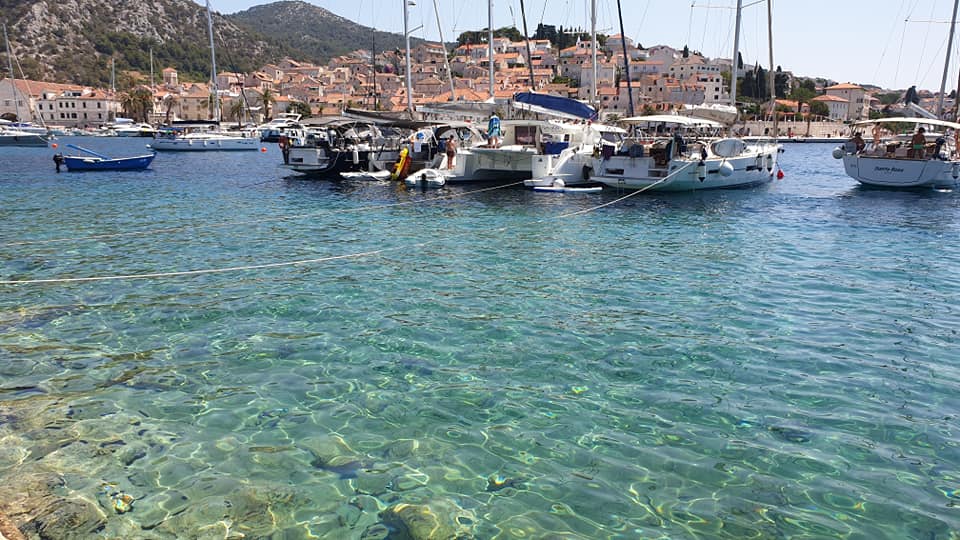
Was all that just a bad dream, I asked myself, as I strolled around last week, a question I asked myself again when talking to my American friend.
Perhaps.
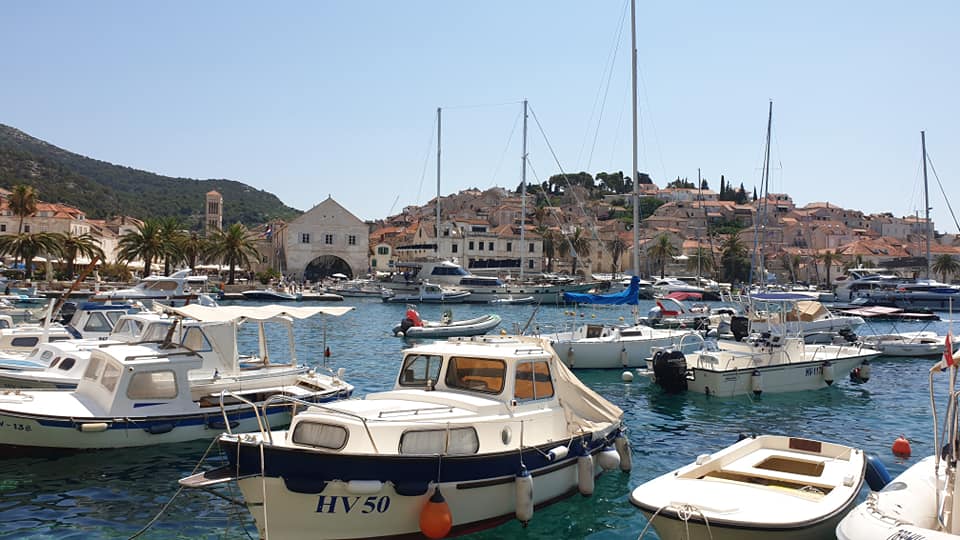
Hvar Town 2021 is magnificent! Those infamous signs are there as a reminder of the recent past, but that is all. The nightlife is still there, but now more contained as it used to be. And in its place, the return of quality on every level. No topless drunkards wandering through the main square carrying open cans of beer, just people relaxing in one of the Adriatic's most beautiful towns.
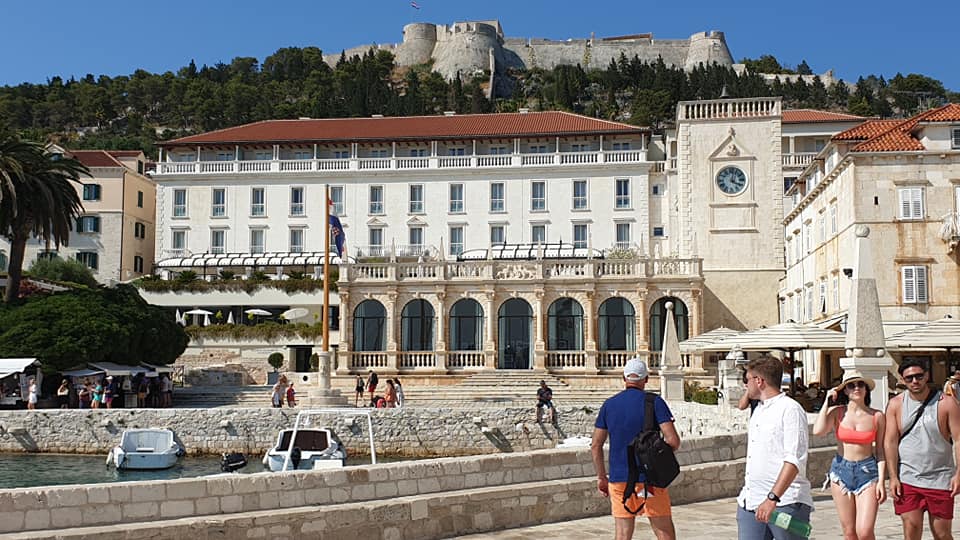
There have been a lot of positives in Hvar Town over the last few years, apart from the scaling back of the party. Europe's oldest public theatre reopened on the main square after a 20-year renovation. Opposite, and across Dalmatia's largest square, the island welcomed its first-ever five star hotel in 2019, as Hotel Palace Elisabeth, hvar heritage hotel, opened its doors on the very place where organised tourism began in Europe with the founding of the Hvar Health Society in 1868.
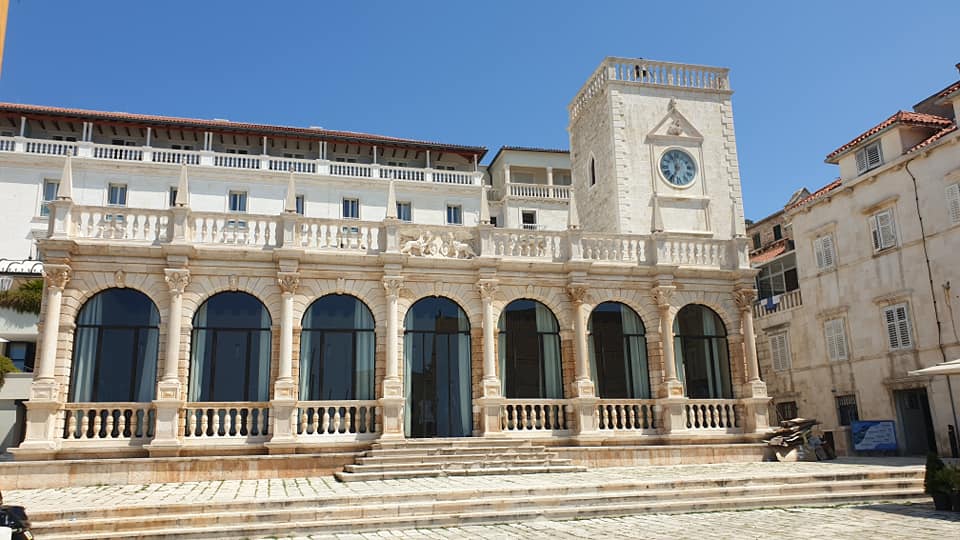
In front of the hotel, the iconic Loggia has also been through an upgrade, and the centre of the town has never looked as appealing as it does at the moment, especially in peak season. The numbers are not quite at pre-pandemic level, but the hotels are completely full, and there is a pleasant relaxed buzz about the place.
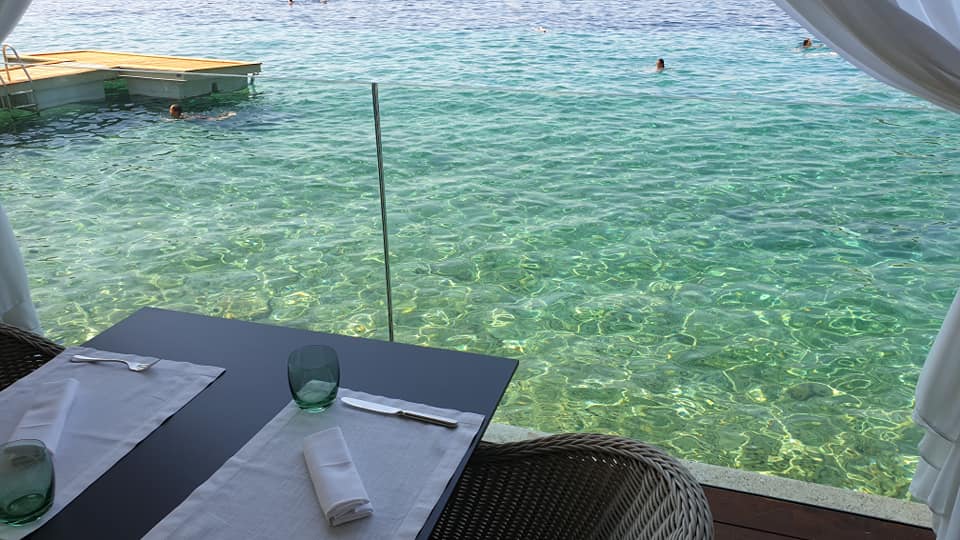
Lunch was a chance to catch up on yet one more renovation and upgrade - the new Suncani Hvar Beach Club, located in the spectacular 1927 Bons les Bains colonnade. With every sunbed and cabana already rented out for the day, I had to console myself with a waterfront lunch instead.
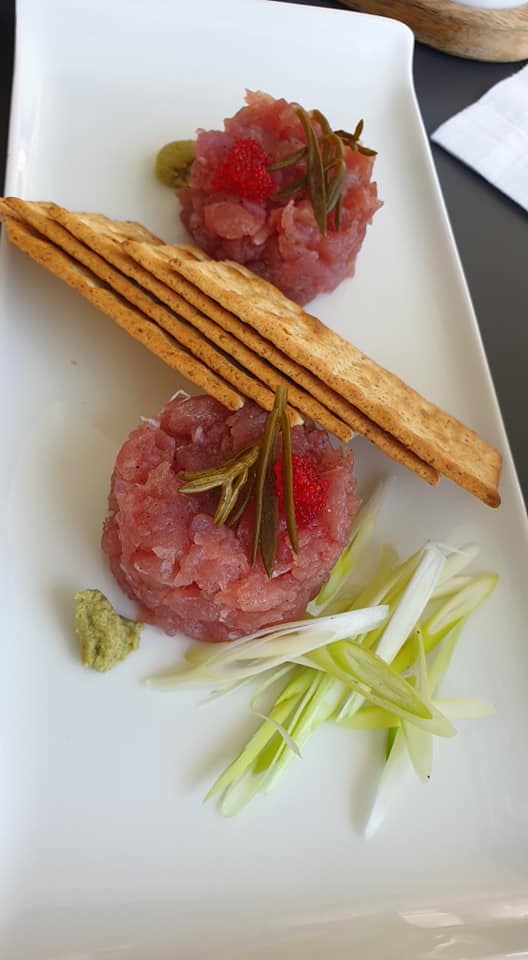
And rather tasty it was, with a shared table including tuna tartare, grilled tuna and shrimp, and lamb chops.
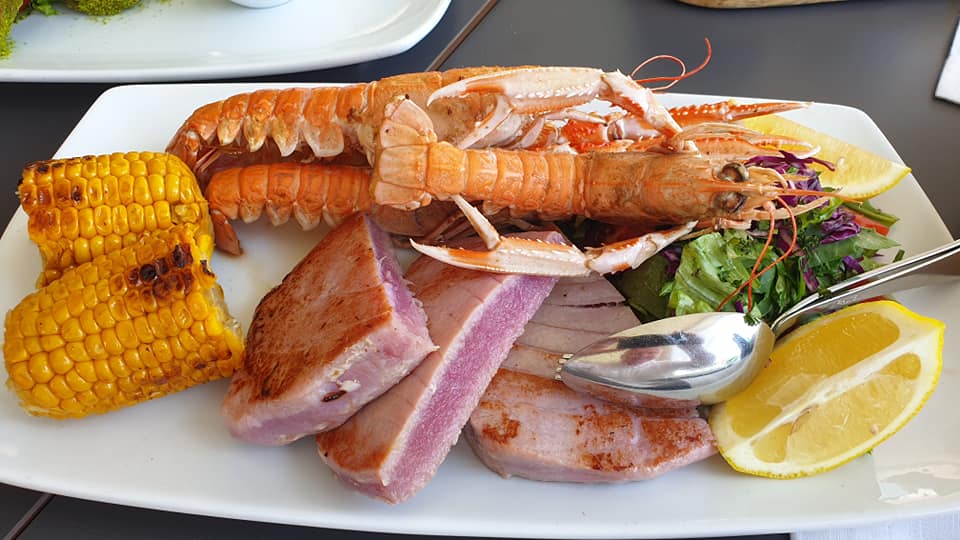
The view to the sea is always magnificent, but there is a real feeling that the town itself has recognised its quality offer and is moving on from the party era in search of more discerning guests looking for a more elegant experience that perhaps they have had in recent years.
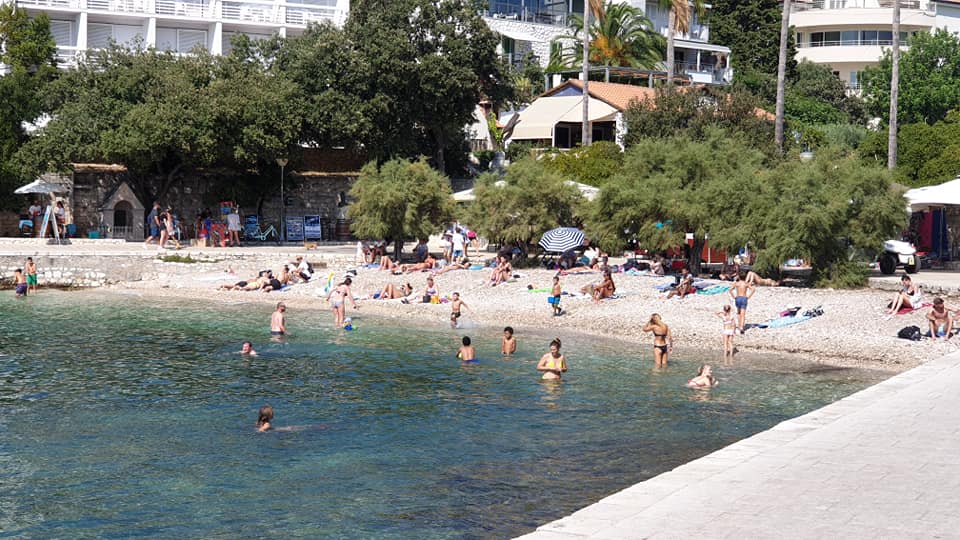
Walking along the waterfront , which was not too busy, was a very pleasant experience, and there were plenty swimming in the little bay next to the 550-year-old Franciscan Monastery. My next meeeting was in Krizna Luka, which was once almost an afterthought compared to the more fashionable centre. But in recent years, it - like the rest of the town - has raised its game. New cafes and restaurants have emerged, and they seem to be growing in popularity with an excellent (and more affordable) offering than in the centre. Krizna Luka is also becoming more central to local life, with more apparently more cafes open there during the winter than in the centre.
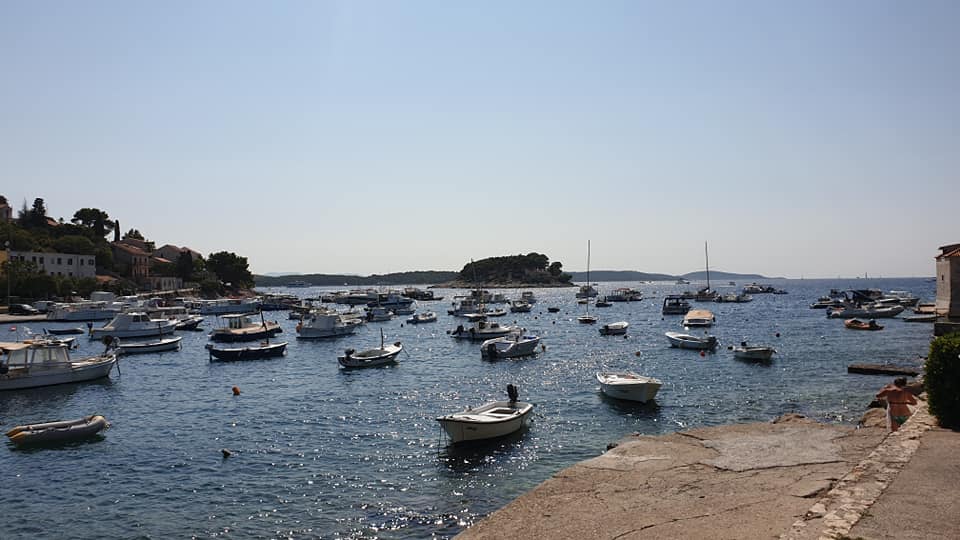
The pandemic has wreaked much havoc and destruction to tourism all over the world. But maybe, just maybe, it has also contrinbuted to a tourism mindset reset in certain quarters. Aided by a very focused strategy of the Hvar tourism chiefs, things are finally moving very much in the right direction.
If you have never been to Hvar, now is the time.
To learn more about Hvar Town, check out the TC Hvar Town in a Page guide.


